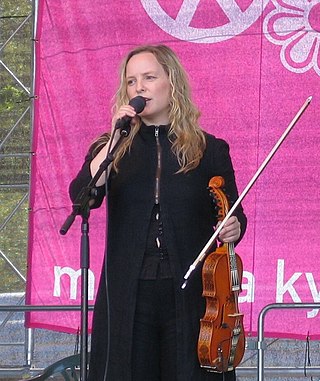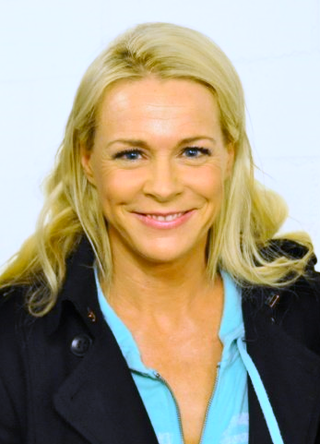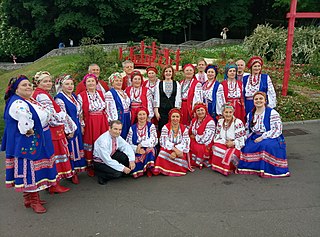
Polyphony is a type of musical texture consisting of two or more simultaneous lines of independent melody, as opposed to a musical texture with just one voice (monophony) or a texture with one dominant melodic voice accompanied by chords (homophony).

Overtone singing, also known as overtone chanting, harmonic singing, polyphonic overtone singing, or diphonic singing, is a set of singing techniques in which the vocalist manipulates the resonances of the vocal tract to arouse the perception of additional separate notes beyond the fundamental frequency that is being produced.

The music of Sweden shares roots with its neighbouring countries in Scandinavia, as well as Eastern Europe, including polka, schottische, waltz, polska and mazurka. The Swedish fiddle and nyckelharpa are among the most common Swedish folk instruments. The instrumental genre is the biggest one in Sweden. In the 1960s, Swedish youth sparked a roots revival in Swedish folk culture. Many joined Spelmanslag and performed on mainstream radio and TV. They focused on instrumental polska music, with vocals and influences from other traditional genres becoming more prominent since the 1990s. By 1970, the "dansband" culture also began. Music in Sweden is a vital part of Swedish culture, as evidenced by the national success of musical shows like Allsång på Skansen and Melodifestivalen.
Ukrainian music covers diverse and multiple component elements of the music that is found in the Western and Eastern musical civilization. It also has a very strong indigenous Slavic and Christian uniqueness whose elements were used among the areas that surround modern Ukraine.
Georgia has rich and still vibrant traditional music, primarily known for arguably the earliest polyphonic tradition of the Christian world. Situated on the border of Europe and Asia, Georgia is also the home of a variety of urban singing styles with a mixture of native polyphony, Middle Eastern monophony and late European harmonic languages. Georgian performers are well represented in the world's leading opera troupes and concert stages.

Kulning, also known as the ”Nordic Herding Call”, refers to high-pitched herding calls that were developed centuries ago in Sweden and Norway. Different regions have different names for these calls, such as kauka, lålla, kula, kulokk, and lockrop. These calls are part of Scandinavian herding music.

Jenny Wilhelms is a Finnish musician. She studied classical and folk music in many Nordic countries. She has been the lead singer of the innovative folk band Gjallarhorn from 1994. Later, according to her bio for her appearance at the 2011 Tampere vocal music festival, she "specialises in vocal physiology for non-classical singers and teaches privately, gives masterclasses and works with choirs and ensembles".

The Rustavi Ensemble, or the Georgian State Academic Ensemble, is a Georgian folk music ensemble that was created in 1968 by Anzor Erkomaishvili, a singer and folklorist from a distinguished Georgian musical lineage that goes back seven generations. Since its formation Rustavi has successfully toured more than 50 countries around the world.
Edea is a Finnish musical group. The Edea's song lyrics are written in an older form of the Finnish language and speak of old traditions as well. The mysterious runic symbols inscribed on the bows of Viking boats, door posts, drinking vessels, and amulets as well as the Finnish composer Sibelius are the source of Edea's music. Edea competed in the Eurovision Song Contest 1998 with their song, Aava.

Hilding Constantin Rosenberg was a Swedish composer and conductor. He is commonly regarded as the first Swedish modernist composer, and one of the most influential figures in 20th-century classical music in Sweden.

Sara Magdalena Ernman is a Swedish mezzo-soprano opera singer. Besides operas and operettas, she has also performed chansons, cabaret, jazz, and appeared in musicals. She is a member of the Royal Swedish Academy of Music. Ernman represented Sweden in the Eurovision Song Contest 2009 with the song "La Voix", finishing in 21st place.

Ukrainian folk music includes a number of varieties of traditional, folkloric, folk-inspired popular music, and folk-inspired European classical music traditions.

Karin Rehnqvist is a Swedish composer and conductor of classical music. She composes chamber music, orchestral works, music for the stage, and particularly vocal music, incorporating elements of folk music such as the vocal technique of Kulning. In 2009 she was appointed the first female professor of composition at the Royal College of Music in Stockholm.

The Complete Vocal Institute also known as CVI, is a private vocal and music institution located in Copenhagen, Denmark. The Institute specialises in the theoretical basis and practical application of the Complete Vocal Technique, a technique for vocalists developed by singer and voice researcher Cathrine Sadolin.

Iso-Polyphony is a traditional part of Albanian folk music and, as such, is included in UNESCO's intangible cultural heritage list. Albanian Iso-Polyphony is considered to have its roots in the many-voiced vajtim, the southern Albanian traditional lamentation of the dead. The instrumental expression of the Albanian Iso-Polyphony evolved into the Albanian kaba.
Shortis and Simpson are an Australian entertainment and political satire duo composed of John Damien Shortis and Moya Simpson. They are singers, composers, political satirists and cabaret artists as well as producers and writers of wide-ranging performance genres. John Shortis is a satirist, singer, songwriter, composer, social historian, and political commentator. Moya Simpson is a singer and actor, and choir director. She immigrated to Australia in 1978. Their work includes, Under the influence which was a music theatre production in 2023.

Susanne Ingegerd Rydén is a Swedish soprano who has been called "Sweden's most renowned singer specialising in early and classical music". She has performed across Europe and abroad. She is currently the preses (chairman) of the Royal Swedish Academy of Music.
Jutta Seppinen is a Finnish conductor and mezzo-soprano.
Amanda Teresia Waesterberg (1842–1918) was a Swedish composer.
Victoria Borisova-Ollas is a Russian-Swedish composer who first received international recognition for her symphonic poem Wings of the Wind which won second prize in the 1998 Masterprize International Composition Competition in the UK.













